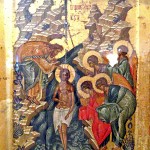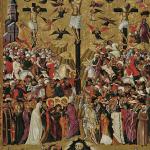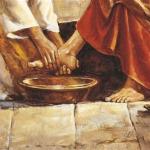
Last year just before midnight on New Year’s Eve, I wanted to post something clever on social media. I had just become a catechumen at my local Eastern Catholic temple, and I thought I’d put something different up. ‘Mary, the Mother of God,’ I discovered, was a ‘solemnity’ (whatever that is) only for the Latins, and I thought it’d be appropriate to make a circumcision joke (e.g. on New Year’s, they do them half off).
That’s when I discovered that in my tradition, January 1 is the Feast of Holy Basil the Great, which sent me on a wild goose chase to find a good icon of Holy Basil to post on Facebook. I had learned about Basil as an evangelical because everybody knows that he was great on the Holy Spirit (I only hung out with cool evangelicals who knew about this stuff and whose bookstores stock St Vladimir Seminary Press’s stuff).
But it wasn’t till after January 1 last year that I really got into the Holy Hierarch Basil’s stuff, and that was not just because I survived the very, very long Divine Liturgy of St Basil the Great a few days later at the Theophany service.
Here’s the story of how the influence of Holy Basil the Great became very personal to me during my Eastern Catholic catechumenate:
I’ve written before (and I will probably reiterate again) that it was around the fifth week of this year’s Great Fast that I really began to take seriously that my catechumenate was making me admit that I was more Byzantine than I had admitted in the past. I attended the Great Canon of St Andrew of Crete, where we did 250 prostrations in three hours (making me sore for five days), after which the reverencing that we do in our churches became an automatic bodily impulse. This was soon followed by a profound experience of Great Week, where I attended the whole series of services from Great Wednesday onwards and even convinced some of my evangelical friends to come along.
Late March and April is also academic conference season for me; it’s when the American Association of Geographers (AAG) meets, and this was especially pronounced for me because I was finishing up teaching an advanced course on cultural geography at Simon Fraser University. Cultural geography is sometimes a difficult field to encapsulate in a simple way, but suffice it to say for our purposes that our flagship journal used to be called for the longest time Ecumene, and by this, the journal didn’t refer so much to the task of ecumenism in an ecclesial way, but to the study of the oikoumene as the inhabited world.
It was while heading to this conference on the heels of teaching this course that I came across a Facebook post from my spiritual father exclaiming that all the time that he had been watching Coffee with Sister Vassa had paid off. I have seldom seen him so excited. ‘Everyone’s favourite book the Pedalion, LOL,’ he wrote cryptically. ‘Economia, the purpose of the canons, WOW! And “hello Uniates”? Hahaha.’
In truly spiritual father fashion, he had also forgotten to post the link to what he was watching. But these cryptic lines led me to start searching on Google to find out who on earth this ‘Sister Vassa’ person he was talking about was.
This video came up, and as I think about it now, it has everything to do with Holy Basil the Great:
Here’s a transcription of the lines especially pertaining to Holy Basil the Great, which was what the initial reference to the Pedalion (the ‘Rudder’ – the big Byzantine book of canons) was about:
Now let’s look at the First Canon of St Basil the Great. What does St Basil talk about in the first canon? He talks about that he himself disagreed with bishops from Asia who decided to accept certain schismatics without rebaptism. Basil himself, along with someone who lived over a century earlier – St Cyprian of Carthage – St Basil thought the whole lot of them – schismatics, heretics – should be rebaptized. However, he says that for the sake of *economia* – the building up of God’s house – because economia is not just a method of interpreting canons – it is *the purpose* of all the canons, as St Basil shows us – he says for the sake of the building up of God’s house, he’ll accept this decision.
So is there just one way of interpreting, of implementing, canons? No. Why not? Because we are the church of the Holy Spirit, and the ministry of our hierarchy and indeed of everyone under the hierarchy is a ministry of the Spirit. As St Paul does remind us in 2 Corinthians 3.6 – what does St Paul say in 2 Corinthians 3.6? The apostle says that we have the ministry that the Lord made us, he gave us the ministry of the Spirit, not the letter, because the Spirit gives life, and the letter kills. So this is something to consider, that the holy canons are in no wise fetters that have the Church chained up for all the ages. No. The church implements canons in her freedom, which is a freedom of the Spirit.
I wrote immediately to my spiritual father. This is great, I said. ‘RIGHT?!?!’ he answered. He really liked several lines that followed, especially: ”Do you sit down at a table, for example, with Greek Catholics and call them “uniates”? “Hello, Uniates?” Is this a good beginning of a dialogue? Does any civilized person who is sane not understand that? We call people what they call themselves.’
I was in fact stunned. Here I had been teaching about the oikoumene in geography en route to a geography conference, and here’s an Orthodox nun lecturing me on economia on YouTube. I had never heard economia used in this sense before, either as the building up of God’s house or as ‘extraordinary concession’ (as I like to call it, ‘wiggle room’), as some of the translations have it.
Sister Vassa was indeed beyond accurate when she referred to our church as a ‘church of the Holy Spirit.’ It was at the end of the conference in San Francisco that I visited Our Lady of Fatima Russian Byzantine Catholic Church and met the Missionaries of Charity there. On my way back to Vancouver, I also stopped by Seattle where I visited my Latin Catholic friends Eugenia Geisel and Lawrence Lam (both of whom have now been mentioned on this blog) who took me to a Divine Mercy Holy Hour, where I started reflecting quite a bit on Divine Mercy and Byzantine spirituality (as Eugenia has also written about on this blog). The Holy Spirit was giving me so many ‘house-building’ experiences, as Sister Vassa would put it.
For me, then, Holy Basil the Great is a key starting point when I think about economia and the canons that are the measuring rods for the building up of G-d’s house. But as I reflect on this even more today, it strikes me that, even though some of this is coming from my subsequent reading of the Holy Hierarch Basil’s writings, the impetus for this reflection simply comes out of my personal encounters brokered through the mysterious work of the Holy Spirit. As one of my astuter critics once said of my blog, I should perhaps consider how much knowledge of Eastern Christianity I have that I’d have audacity to have a blog about Eastern Catholicism. My response is that perhaps I am a typical Byzantine Christian who has not done much reading but only has a simple, shallow knowledge of these profound mysterious from these personal spiritual encounters.
To that end, let us ask the Holy Hierarch Basil to pray to G-d for us. In the last year, we have witnessed so much fragmentation in our contemporary oikoumene. May it be that in 2017, those of us who are called ‘Christians’ may be filled with the Holy Spirit as we participate in the makrodiakonia of economia, the building up of G-d’s house as an act of service to the whole world.















